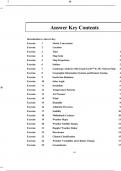Exam (elaborations)
Complete Solution Manual Physical Geography Laboratory Manual 12th Edition Questions & Answers with rationales (Chapter 1-49)
- Module
- Institution
- Book
Physical Geography Laboratory Manual 12th Edition Solution Manual Complete Solution Manual Physical Geography Laboratory Manual 12th Edition Questions & Answers with rationales (Chapter 1-49) PDF File All Pages All Chapters Grade A+
[Show more]



